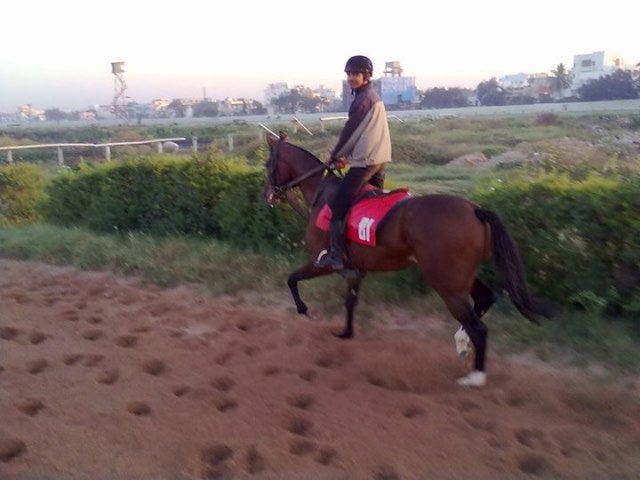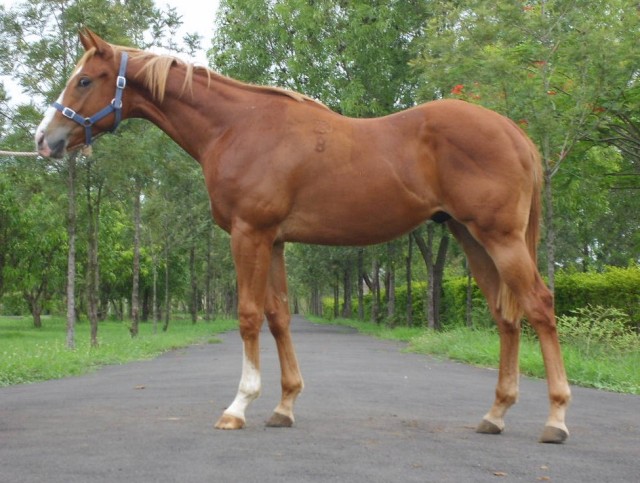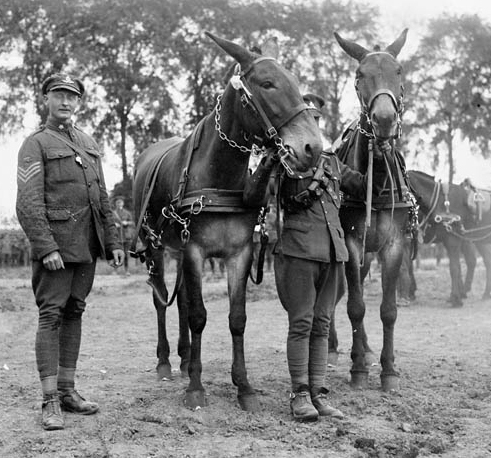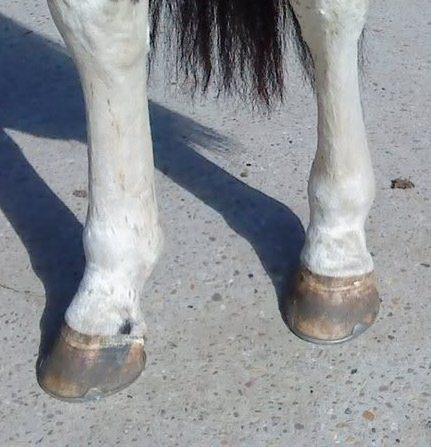QuestionQUESTION: Hi I have a 16.2h warmblood that I have owned for 2.5yrs. Let me first say he is a fabulous horse he has been in professional training since I bought him, I am an amateur adult rider only riding english for 8yrs. Ted carries himself beautifully working through his back I believe I ride him fairly well except for one ongoing issue. He is spooky, he trusts me and is respectful in the round pen and in hand, but under saddle he occasionally spooks at nothing and is difficult to stop. I ride him in a loose ring snaffle and he is being trained for dressage, my coach is trying to get me to be more assertive with him under saddle, she thinks I may need to ride him in a pelham for safety he is a big strong boy what are your thoughts?
ANSWER: Hi Paige, Hi Ted!
Eight years is a good bit of time, so I'm guessing you are pretty handy in the saddle by now! This is one of those situations where the horse has been asked to go to college without ever having been to kindergarten.
No matter what the final goal for the horse is, there is no substitute for good basic horsemanship. Three day event, hunter, dressage, western pleasure, trail, what ever, the horse must have the basics of how to control the feet, what to do with the energy in the body, how to feel secure and translate the confidence from ground work to the saddle in order to meet his goals as a finished saddle horse. A harsher bit is not going to do that for you or your horse. He needs to understand what to do when scary things happen. He need to know that he can survive the spooky stuff and not feel trapped or that he is in a bind he cannot survive. Horses are honest to the core. When he spooks he is just saying gosh that bugged me and I'm not confident. Hurting him with a pelham is only going to increase his fear and cause a bigger spook because now he is scared and in pain. Stay with your snaffle. I'm going to give you some things to do with your horse that he missed in his earlier education and will really help him.
First, watch anything by Walter Zettl, and Ray Hunt. Walter and Ray spend time together every winter and the two of them give me chills! Walter is a dressage master of the highest form, and Ray is a master horseman. I want you to go back to the round pen with your guy. Start by hooking him on, teaching him to yield his hind quarters, and exposing him to a flag, tarp and slicker. When working with the flag, you will want him to be relaxed and comfortable with it (actually all three, flag tarp,slicker) walking and standing still. Do not make him stand still. If he can't stand allow him to walk around you in a 10m circle yielding his hind quarters, keep his fronts stepping in a smaller circle than the hinds but, do not allow the fronts to brace up and stop, you want soft, fluid movement here. Expose your horse as much as he can handle, but stay on the edge of trouble with him. The goal here is to build confidence and show him that he can handle any mystery trouble that comes up with security and confidence and you will be there to support him and show him the way. Expose with the flag all over his body, especially in the blind spots. One very troubling spot for a horse is in front of the front legs. Be very careful here, as some horses will strike at the flag. This is an important spot to take care of. Only expose with the flag for a moment and get the flag out BEFORE your horse feels the need to strike at it. As he develops more confidence, the flag can stay longer, but get into the habit of keeping the flag moving smoothly all around him. Do the same while walking. Then do the same with a tarp and your slicker or a coat or your saddle pad. Do this every day before you ride. Do this literally hundreds of times until you can get careless with your flag (tarp and slicker) You want your horse to be relaxed and confident. You want him to stand on a loose lead as you flap, flog, toss and drag the FTS (flag, tarp, slicker) all over. Depending on your feel and timing, this may take you a while to get with quality. If you feel you are scaring your horse, your timing may be off. Let me know and I'll walk you through specific parts again.
It would be my wish that every horse start out in the round pen and have great basic horsemanship skills built in before ever moving on to advanced training. It would save the horse so much and not create fear in the rider. When in the saddle, yielding the hindquarters is your emergency brake. When a horse is MADE to stand still it creates a trap for the horse and scares them. While standing still may make the human feel better in a spooky situation, it is the exact opposite of what the horse is needing. Yielding the hindquarters (and not locking up the front end) allows the horse to relax, keeps the rider safe by not allowing the horse to bolt off or buck, and allows the team to reorganize, feel secure before trying to carry on again. The greatest advantage to some basic deep bending is the later benefit of greatly increased dressage scores! When you really have control of each and every footfall, imagine what you can do!
Some of the other things that really help horses like yours would be to teach him to lead by the front feet, teaching him to stop on the hind feet, roping up the belly, and flanks and teaching him to come off pressure and lead from the belly and flank or where ever you choose to place your lass rope. Getting your horse to understand the connection between the rein and his feet so that when you lift a direct rein the foot follows, softly! I hope your coach is having you count cadence?!? That is the ability to tell when each foot is leaving or striking the ground. The only time you can influence the flight of the foot is when it is in the air. This is so meaningful to the horse. It means you are riding as one and not pulling in an unnecessary fashion when the foot is on the ground and cannot be influenced.
Try a few of these things. If I have used terms or concepts that you do not quite understand, please let me know and I will clarify. Taking care of your horses fear will go a long way in improved scores. After all relaxation is key in dressage as well as not being against the hand. So, resist the urge to use another bit, this will only create more resistance and a brace. Go back to the basics and solve the NEED to spook! Keep me posted! I see lots of 8's in your future (and a 9, too)!
Smiles! Denise
---------- FOLLOW-UP ----------
QUESTION: Hi thanks for the info I had a good talk with my coach and she agreed I needed to do more ground work with my horse. after just one session in hand he already is starting to relax and let me be the leader. It's easy to overlook when your horse is being disrespectful and sometimes we need to be reminded of the boundaries between horse and rider. I can see when my horse respects me as his leader then he trusts me, I let that aspect of my handling slide. after all they think like horses not like people
AnswerHi Again Paige! and Ted too!
I call these "light bulb" moments! When the obvious becomes clear. I was having a discussion with Ricky earlier this year about a very simple concept and I swore up and down was something we had NEVER, EVER worked on before...then I saw a picture...ooops!
I just wasn't ready for the information. I wasn't "there" in my development. I could almost hear myself saying, "all of a sudden"...it is never all of a sudden, when you are ready for the information, the light comes on. Simple as that. Sometimes we have to have more experience for the lessons to mean something. This is why we are students of the horse and we are always searching. It is such a joy to be around Ray Hunt when he tells us that when we get all of this horsemanship figured out, to come and fill him in because he is still learning...Ray, humble and truly a student of the horse. Every day I learn something new from the horse, something that has a huge impact on my horsemanship and my communication with my horses. Sometimes they are lessons it takes me a long time to really learn and become part of who I am. That is the frustration and the joy!
I'm so happy for you. You are starting to figure out some of the concepts that are at the very core of true unity and great horsemanship. Enjoy!
Smiles! Denise

 hind quarters engaged while trotting
Question
hind quarters engaged
hello maam, woul
hind quarters engaged while trotting
Question
hind quarters engaged
hello maam, woul
 deep ribcage
Question
deep ribcage
hello maam, does this hors
deep ribcage
Question
deep ribcage
hello maam, does this hors
 trotting on the road
Question
road
hello. i am rohit from india. i ha
trotting on the road
Question
road
hello. i am rohit from india. i ha
 mules with horses
Question
mules
hello maam, are mules good for pleasure
mules with horses
Question
mules
hello maam, are mules good for pleasure
 legs filled up
Question
image 1 image 2
hello Brittney. m
legs filled up
Question
image 1 image 2
hello Brittney. m